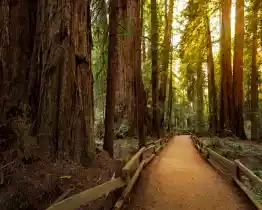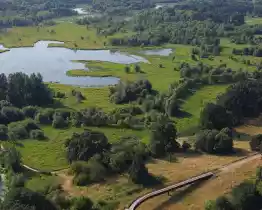Modal Header
- econews
How to travel more eco-friendly
It’s the ultimate dream for many people, squeeze your life into a backpack and set off to explore places that many have never even heard of, or perhaps just escape from the rat race for a week or two and go lie on a beach somewhere.
But with all the talk of carbon footprints and responsible travel, should we feel guilty about wanting to jump on a plane and get on outta here?
Well fortunately for you guys, I am here to share some tips to help you become more eco-conscious in your quest for adventure.
First of all, why is travelling bad for the environment?
Air travel has become more accessible to most people these days, with low cost air carriers popping up all over the place. According to Wikipedia air travel is the number one form of long distance travel in the US.
It’s a way of getting to your best friend’s wedding or your family reunion in a short amount of time, without breaking the bank.
Although it may be a convenient way of getting from A to B, it’s not so great for our planet. Aircrafts produce a high amount of CO2, especially during take-off and landing. However, when comparing a long distance by car, air travel has the advantage as the number of passengers they can transport is far greater than that of a car.
Trains on the other hand, are by far the winner, especially when adding the fact that train stations are normally centrally located, as opposed to airports which are often outside of cities.
Here’s what you can do to help without devoiding yourself of the chance to see our beautiful planet:
Offset your emissions. Many companies give you the option to pay a little extra when booking your ticket. This aims to make your journey more eco friendly by funding projects that are committed to finding ways to reduce our carbon emissions. This may include investing it into renewable energy or reforestation.
Getting to and from the airport. Yes, it’s nice to be dropped off or picked up at the airport by a friend or family member, but next time you set off on your holidays, think about getting public transport instead. That’s four car journeys saved right there!
Reusable water bottle. We’ve all seen the huge amounts of plastic bottles in the bins just before security. And quite frankly it’s annoying having to throw away a perfectly good bottle of water and then have to buy another one a few minutes later at double the price.
You can now purchase reusable water bottles that fold down to almost nothing when empty and clip onto your bag.
Some airports have places to fill up your water bottle once you are through security – assuming that it is safe to drink the water of the country you are in of course.
Say “no” to plane food. Long haul flights come with inflight meals, that come packaged in plastic, that come with plastic utensils, that come packaged in plastic. Do you see where I’m going here? Unless you particularly look forward to soggy, flavourless food, request no inflight meal and take your own, probably much nicer, packed lunch with you.
Hitchhike or carshare. Ok, so I’m not encouraging hitchhiking, but I’m also not discouraging it! If you feel like you are someone who can trust your instincts and are perhaps travelling with another person, this could be a way to go.
Ridesharing is very popular these days and there are various apps available where you can check the drivers rating and even share your live location with family members, to make sure that you are safe.
Eat local. Experiencing the local culture is one of the best things about travelling, and a huge part of that culture is food. When you visit a country, eat what the locals are eating. Don’t travel to the other side of the world and then search for a McDonald’s or other international franchises. Spend your money in the local restaurants where the ingredients are more likely to be locally grown rather than imported. You never know, you might just find your new favourite meal.
Join a cleanup movement on the beach. Check out if there are any volunteer groups near you that meet up to clean up, like this one in California. You get to spend a day on the beach, meet some cool people and feel good about yourself for doing your bit for the planet.
Use ‘reef safe’ sunscreen. Sunscreen is a must. Unfortunately, whenever we bathe in the sea or take a shower, that sunscreen ends up in the ocean. A lot of these creams contain chemicals like Oxybenzone or Octinoxate which are extremely harmful to coral reefs. The death of coral reefs, which is happening at an alarming rate, will have a disastrous effect on sea life, and in turn, humans.
Coral reef safe sunscreens are widely available these days. Make sure to check the ingredients as you want a physical sunscreen (zinc or titanium dioxide) rather than a chemical one, and it should not contain nanoparticles. This one from Fuka Eri is a good example and it’s also not packaged in plastic, so it’s a win-win!
Leave no trace. Wherever you go, whatever you do, take your rubbish with you and then dispose of it in the correct bins once you find them. Seriously though, who even still thinks it’s ok to have a picnic and just dump their leftovers and go on their jolly way? Even your apple cores and banana skins, despite common belief, should not be thrown out of the car window or into a bush to decompose. Although this may feel like the eco-friendly thing to do, it is not great for wildlife. They may start searching for food by the sides of the roads, which of course is not the safest place for them to be and if these foods are not a part of their normal diet, it can upset their digestive system.
Conclusion:
We live in a vast and beautiful world and travelling helps us to broaden our minds and to embrace different cultures and backgrounds – which can never be a bad thing, right?
It would be criminal if we all decided to stay in our little corner of the world and never experience what else there is on offer.
So if we become better educated regarding climate change, and do what we can to help, we can still enjoy our trips (pretty much) guilt free.
What eco-friendly travel tips do you have? Please share with us in the comments.
DISCOVER

Related Articles
Message
Thanks for signing up. Please confirm your email address, check your inbox and verify your email.




















